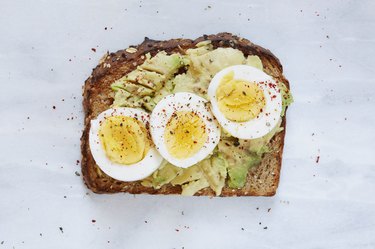
A boiled-egg-and-toast diet for breakfast can be healthy, depending on the type of bread you use. Hard-boiled eggs are an important source of "good" HDL cholesterol which helps lower the risk of cardiovascular diseases caused by "bad" LDL cholesterol.
Eggs and Toast Calories Information
Video of the Day
According to the USDA, large, hard-boiled eggs for breakfast have approximately 78 calories, contributing about 4 percent of a body's daily energy requirements. Boiled eggs for breakfast are also high in cholesterol, with one egg offering 186.5 milligrams, or 62 percent of the daily value of an individual's recommended cholesterol intake.
Video of the Day
Eggs are also a good source of protein. Eating boiled eggs for breakfast means getting approximately 13 percent of the day's dose of protein — each egg offers 6.3 grams of this essential macronutrient, which is required by the body for processes such as repairing cells and muscle development.
Read more: The 20 Best Ways to Use Eggs
At 23 percent of the daily value of vitamin B12, adding boiled eggs for breakfast to your daily diet will ensure you get this essential vitamin, which cannot be produced by the body. Vitamin B12 is required for a properly functioning nervous system and healthy red blood cells. Hard-boiled eggs are also good sources of vitamin A, vitamin D and vitamin E, fat-soluble vitamins that help with immunity and keeping your bones healthy.
A single slice of toasted bread has approximately 75 calories, 1.1 grams of fiber, 3.1 grams of protein and 13.4 grams of carbohydrates. Toasted bread typically offers no cholesterol, and little to no vitamins. It may, however, contain minerals like sodium, calcium, iron and magnesium, which help with preventing muscle cramps, preserving vision and boosting the immune system.
The number of eggs and toast calories are: 228 calories for one hard-boiled egg, and two slices of toasted wheat bread. If using thinly sliced white bread, the calorie count decreases to 176 calories, as a single slice of this bread has just 49 calories.
Boiled Egg on Toast Benefits
A boiled egg and toast diet for breakfast can be an ideal low-calorie option if using egg whites. According to the USDA, one large, scrambled egg white has just 35.6 calories and 3.81 grams of protein. It is, however, low in dietary cholesterol — offering only 5.28 milligrams, compared with a hard-boiled egg's 186.5 milligrams.
Based on a small study carried out on 38 individuals published in the March 2017 issue of Lipids, researchers found that a daily consumption of eggs resulted in an increase in levels of HDL cholesterol and a decrease in LDL cholesterol levels. HDL cholesterol, Harvard Health Publishing explains, is often referred to as the "good cholesterol" that helps in preventing the incidence of blocked arteries.
Eating boiled eggs for breakfast in moderation will also not increase your risk of cardiovascular disease. In fact, eggs even contain low levels of saturated fat; a single boiled egg offers approximately 1.6 grams or 8 percent of the daily value of saturated fat.
If you're wondering, "Are boiled eggs on toast healthy for a snack?" MSU Extension, says that the answer is yes. Hard-boiled eggs are good sources of nine essential amino acids — building blocks that the body requires to make proteins, and which it cannot make itself. Compared to other sources of protein, hard-boiled eggs are also a cheaper alternative.
For a boiled egg and toast diet, hard-boiled eggs are preferable to soft boiled eggs, in order to reduce the chance of foodborne illness. According to the Ohio State University College of Food, Agricultural, and Environmental Sciences, there is a higher risk of salmonella contamination when consuming a soft boiled egg.
Researchers of a February 2015 study published in the International Journal of Environmental Research and Public Health explain that proper food handling techniques can help manage the spread of salmonella. This rate of salmonella contamination also reduces when making hard-boiled eggs for breakfast.
- USDA: “Nutrition Facts for Hard Boiled Eggs"
- USDA: "Nutrition Facts for Bread Wheat Toasted"
- USDA: "Nutrition Facts for Toasted White Bread"
- USDA FoodData Central: "Egg White Omelet, Scrambled, or Fried, Made With Butter"
- MSU Extension: "Easy Hard-Boiled Eggs"
- Ohio State University College of Food, Agricultural, and Environmental Sciences: "Chow Line: Hard-Boiled Eggs Safer Choice Than Soft-Boiled Eggs for Easter"
- International Journal of Environmental Research and Public Health: "Salmonella and Eggs: From Production to Plate”
- Harvard Health Publishing: "Are Eggs Risky for Heart Health?"
- Lipids: "Intake of up to 3 Eggs/Day Increases HDL Cholesterol and Plasma Choline While Plasma Trimethylamine-N-oxide Is Unchanged in a Healthy Population"
- Harvard Health Publishing: "HDL: The Good, but Complex, Cholesterol"